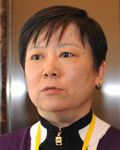|

CPPCC National Committee member and President of China International Publishing Group Zhou Mingwei said the designating of the two new national days by law is an effort by the Chinese people to safeguard the victory of World War II and the postwar international order. It aims to encourage Chinese people to remember their history as well as to tell the world that Chinese people will use a peaceful approach to reach their goals.
"To remember history is not to nurse hatred but to use it as a mirror to look forward," Ambassador Cheng said. "I hope Japan can face up to history and show sincerity in its desire to hold pragmatic talks with China on related issues, bringing Sino-Japanese relations back on a healthy, stable as well as mutual beneficiary track with joint efforts."
Complicated relations
A China-Japan joint public opinion poll released by China Daily and Japan's Genron NPO in 2013 showed that more than 90 percent of respondents from each country replied they have unfavorable impressions of each other. But on the other hand, more than 70 percent of respondents from both countries hope the two countries could improve bilateral relations.
Zhou addressed the matter by noting, "One of the current plights of Sino-Japanese relations is the loss of mutual trust between the people of the two countries, which is also what concerns me the most. The emotional response of the two peoples when concerning major bilateral problems will affect the policies of the two governments and bilateral relations."
"Sino-Japanese relations are very complicated," Zhou said. "Thus, we should avoid handling these relations simplistically or emotionally. We should not indiscriminately regard Japan as a rival, mistreat the Japanese people or boycott Japanese products. It does not contribute to the settlement of bilateral disputes."
Zhou stressed strictly separating and treating differently ordinary Japanese people from Japanese right-wing forces when concerning the disputes.
"Like us, most Japanese people want peace and improved relations with neighboring countries including China," said Cheng. He added that with regard to the war, most Japanese people have painful memories. They also hope that there will be no such cruel wars in the future and that history will not be repeated. Many of them have reflected deeply on history and the war, and do not support their political leaders' visits to the Yasukuni Shrine, which honors fallen Japanese soldiers alongside several high-level officials executed for war crimes after World War II.

"Even as the current Sino-Japanese relations have reached a freezing point, people-to-people exchange between the two countries should not be intermitted. We should employ the positive effect of people-to-people diplomacy to improve the deteriorated Sino-Japanese bilateral relationship," said Li Xiaolin, CPPCC National Committee member and President of the Chinese People's Association for Friendship With Foreign Countries (CPAFFC).
"People-to-people diplomacy and promoting official relations through people-to-people exchange are unique traditions of the Sino-Japanese relationship," said Cheng. Cheng recalled that after the founding of the People's Republic of China in 1949, though the two countries didn't establish an official relationship immediately, people-to-people exchange between the two warmed up swiftly, which laid a solid foundation of public opinion for the eventual normalization of bilateral official relations.
"Now we should revitalize and further consolidate the role of people-to-people diplomacy in promoting Sino-Japanese relations," said Cheng.
Li said that the CPAFFC is preparing to invite more peace-loving Japanese parliamentarians to visit China to deepen mutual understanding. "We need to encourage more peace-loving Japanese people to express their opinions and jointly safeguard the victory of World War II and the postwar international order," said Li. "Non-governmental organizations for bilateral friendship from both countries should cooperate much more closely to get Sino-Japanese relations back on the right track of mutual benefit."
Email us at: yanwei@bjreview.com | 